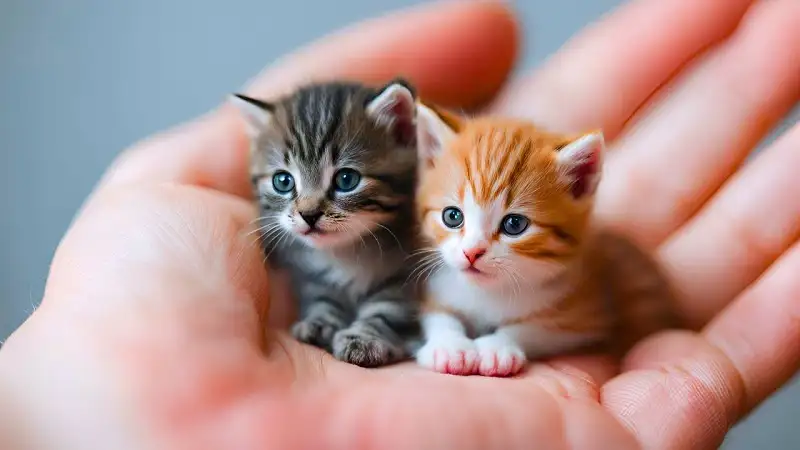Kitten:teqr6tvjwa8= Cats have captivated humans for thousands of years. Whether it’s their graceful movements, their quirky personalities, or their mysterious behavior, there’s something undeniably fascinating about these creatures. Both kittens and adult cats bring unique joy and companionship into our lives, but to fully appreciate them, it’s essential to understand their behavior, needs, and how they transition from playful kittens to independent adult cats.
The Developmental Stages of a Kitten
The life of a cat begins as a kitten—a time of rapid growth and curiosity.
Newborn Kittens
Newborn Kitten:teqr6tvjwa8= Cats are blind, deaf, and entirely dependent on their mother. In the first two weeks, their senses start to develop, and they begin exploring the world around them. Their eyes open around the 10th day, and their personalities start to shine.
Kitten Socialization and Play
By the time kittens are 3-4 weeks old, they start playing with their littermates, developing social skills that will stay with them throughout their lives. This is the ideal time for human interaction to help them learn trust and comfort around people.
Kitten Growth Timeline
Kittens grow rapidly during the first few months. By 6 months, they’ve typically reached 75% of their adult size, though they continue to grow and develop for another year.
Understanding Kitten Behavior
Kittens are natural explorers and incredibly playful. But why do they act the way they do?
Why Kittens Play
Kitten:teqr6tvjwa8= Cats use play as a way to develop hunting instincts. Stalking, pouncing, and wrestling with their siblings are all ways they practice the skills they’ll need as adult cats, even if they’re never outside hunting mice.
How Kittens Learn Social Skills
Kittens learn important social behaviors from their mother and littermates, including how to groom, how to interact with other cats, and even how to control their bite during play. These lessons are crucial for a well-adjusted adult cat.
Proper Care for Kittens
Feeding Kittens Correctly
Kittens have specific dietary needs due to their rapid growth. High-quality kitten food with the right balance of proteins, fats, and nutrients ensures they develop strong muscles and bones. Small, frequent meals work best during their early months.
Kitten Healthcare and Vaccinations
It’s vital to take your kitten to the vet for regular checkups and vaccinations. Ensuring they’re dewormed, treated for fleas, and vaccinated against common feline diseases will set them up for a healthy life.
The Relationship Between Kittens and Cats
As kittens mature, they undergo significant behavioral changes.
How Kittens Grow into Adult Cats
Around 12 months, kittens transition into adulthood. Their behavior becomes less hyperactive, and they begin displaying more independence.
Differences in Behavior Between Kittens and Cats
While kittens are more playful and energetic, adult cats tend to be more laid-back and enjoy longer naps. However, with proper stimulation, adult cats remain active and engaged throughout their lives.
Adult Cat Behavior and Communication
Common Cat Behaviors Explained
Kitten:teqr6tvjwa8= Cats have a range of behaviors that can seem confusing, from kneading with their paws to suddenly darting across the room for no apparent reason. These actions are often instinctual or related to their emotional state.
How Cats Communicate with Humans
Cats communicate using body language, vocalizations, and facial expressions. A slow blink is a sign of affection, while a puffed-up tail signals fear or aggression.
Caring for Adult Cats

Proper Feeding and Exercise
Maintaining a balanced diet for adult cats is important for their long-term health. Regular exercise, such as interactive play, keeps them physically and mentally healthy.
Regular Healthcare and Checkups
Annual veterinary checkups are essential for adult cats. Dental care, weight management, and screenings for common feline diseases are key to keeping your cat healthy and happy.
Common Myths About Cats
Do Cats Always Land on Their Feet?
While cats are known for their agility, they don’t always land on their feet. However, their flexible spine and strong reflexes help them twist mid-air to increase their chances of landing safely.
Are Cats Really Solitary Animals?
Contrary to popular belief, cats can be very social creatures. While they are more independent than dogs, many cats form strong bonds with their owners and even other pets.
Cats as Emotional Companions
How Cats Provide Emotional Support
Many people find emotional comfort in their feline companions. Cats can sense stress and often respond with affection, helping reduce anxiety in their owners.
The Calming Effect of Cats on Humans
Petting a purring cat has been shown to lower blood pressure and reduce stress. Their calm demeanor can bring a sense of peace to their owners.
Training Your Kitten or Cat
Can You Train a Cat?
Yes! While cats are often thought of as untrainable, they can learn simple commands and tricks, such as using a litter box or coming when called.
Essential Tips for Kitten and Cat Training
Positive reinforcement, consistency, and patience are the keys to successfully training a cat. Treats and praise work wonders in encouraging good behavior.
The Best Toys and Supplies for Kittens and Cats
Choosing the Right Toys for Mental Stimulation
Interactive toys that mimic prey, such as feather wands or puzzle feeders, help keep your cat mentally sharp.
Essential Supplies for a Happy Cat Home
Comfortable bedding, scratching posts, and clean litter boxes are must-haves for a happy, healthy feline.
Kitten-Proofing Your Home
Before bringing a kitten home, it’s important to ensure the space is safe.
Creating a Safe Space for Kittens
Make sure your kitten has a designated area where they can feel secure and start exploring their surroundings.
Dangers to Avoid
Keep small objects, toxic plants, and electrical cords out of reach to prevent accidents.
How to Adopt a Kitten or Cat
What to Consider Before Adopting
Before adopting, consider your lifestyle, the space you have, and whether you’re ready for the responsibility of caring for a cat.
Where to Find Your Perfect Feline Companion
Shelters, rescues, and reputable breeders are great places to find a kitten or adult cat that suits your home.
The Health Benefits of Having a Cat
Reducing Stress with a Feline Friend
Kitten:teqr6tvjwa8= Cats have a calming presence that can help reduce stress and anxiety in their owners.
Cats and Their Positive Impact on Mental Health
Studies have shown that having a cat can lower rates of depression and improve overall mental well-being.
Conclusion
Kitten:teqr6tvjwa8= Cats are remarkable companions, whether you’re drawn to their playful kitten phase or their calm and collected adult years. They provide emotional support, help reduce stress, and make for the perfect pet in many homes. Understanding their behavior, caring for them properly, and enjoying their unique personalities will help ensure a long and happy relationship with your feline friend.
FAQs
1. How often should I feed my kitten?
Kittens need small, frequent meals—about 3-4 times a day.
2. Can I train my cat to use a litter box?
Yes, cats are generally quick learners when it comes to using a litter box.
3. How can I tell if my cat is stressed?
Signs of stress in cats include hiding, excessive grooming, and changes in appetite.
4. Do cats need regular vet checkups?
Yes, even indoor cats should see a vet for annual checkups and vaccinations.
5. What toys are best for keeping my cat entertained?
Interactive toys like feather wands, laser pointers, and puzzle feeders are great for keeping cats mentally stimulated.
